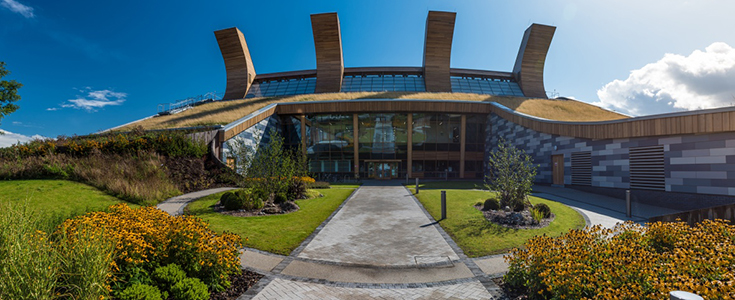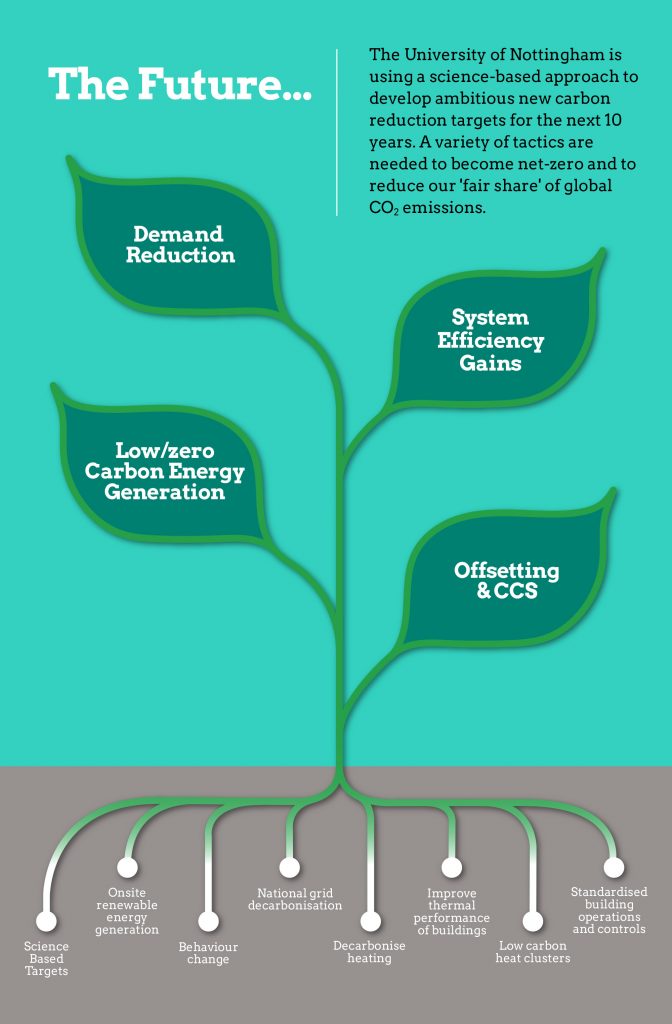
November 4, 2021, by sustainablenottingham
COP26: how can the university reach net zero carbon emissions?
Following the publication of the University Strategy (2020) and its emphasis on environmental sustainability, the university has set ambitious science-based carbon reduction targets for scope 1 and 2 emissions (predominantly natural gas and grid supplied power use).
Reaching net zero
Science based targets determine what reduction we need to achieve to deliver ‘our fair share’ on limiting global warming to a maximum of 1.5C. To avoid the variation in energy use during Covid19 lockdowns, we have re-baselined our current emissions to reporting year 2018/19.
This science-based target approach requires us to achieve a 63% reduction in carbon emissions by 2030. This equates to a drop from 42,500 t in 18/19 to 15,725 t CO2.
To achieve this ambition, we are assessing all carbon impacts associated with the university’s activities, from teaching and research to the operational impact of our buildings and infrastructure. Interventions to improve systems efficiency, generating more of our own power, and changing the way we have previously done things will all drive down our CO2 emissions.
The principals around achieving these targets are based on four key themes.
Demand reduction
Demand reduction is the reduction in energy required by avoiding or removing the activity in the first place, turning the energy source down or off whenever possible. These may be new habits that we have to adopt, and the whole university community must get on board with this.
Three quarters of the university’s electricity consumption is in your control. Turning off lights, laptops and lab equipment across the university adds up. If all the lights on our UK campuses were left on overnight, it would create around 15 tonnes of CO2 in a single evening! So, go! Switch Off and make your sustainable choices matter.

Demand reduction also includes minimising the heat needed to keep our buildings warm by increasing levels of insulation to walls, roofs and replacement of windows etc. This will be a major intervention we have to undertake as part of the work required to decarbonise the supply of heat to our buildings.
Efficiency gains
Efficiency improvements involves the replacement of energy consuming equipment from buildings, such as boilers, chilled water systems, ventilation system fans, heating system pumps and lighting. This also includes departmental equipment, particularly in the science, engineering and medical sciences areas, such as -80 freezers, air compressors, drying cabinets and ovens etc.
The plan is to replace all the older, inefficient equipment, after first considering if a replacement is in fact needed. Can the process be avoided, carried out on other equipment and can samples for cold storage be kept in other shared freezers?
Low/zero carbon energy generation
The decarbonisation of heat to our buildings is the greatest challenge. Low/zero carbon energy generation will require significant investment and won’t be a quick fix. We’re potentially looking at a 10 to 15-year programme of building improvements, many of which will be integrated with general large-scale refurbishment projects to minimise cost and disruption.
Following successful upgrades, we can, in most installations, replace existing gas fired boiler plant with electric heat pumps. As the UK power grid decarbonises, this will lead to zero carbon heating. This is the medium to long-term plan and natural gas will still need to play an essential role during this transition.
Carbon offsetting

Trees planted as part of Diamond Wood at Sutton Bonington
Carbon offsetting refers to the action of compensating for emissions of CO2 by participating in schemes designed to remove the equivalent amount of CO2 from the atmosphere elsewhere, for example by planting trees.
Offsetting should be the final stage of minimising the environmental impact of our carbon emissions once all other measures have been completed. It is used to offset those emissions that cannot otherwise be removed.
We are currently involved in a trial carbon offsetting scheme organised by the Environmental Association of Universities and Colleges to gain a better understanding of the various types of offsetting, how they work and what they will achieve.
University climate change research
As a university, we carry out research to address the issues of climate change, which spans key themes of COP26, currently taking place in Glasgow. This includes work on crop trials, low impact dairy farming and global farming.
However perhaps the research with potentially the biggest impact is carbon capture and storage. Researchers in our engineering faculty are working on a filtration system which effectively ‘sticks’ CO2 from the atmosphere onto material with an incredible surface area to mass ratio. These materials are currently very expensive, so research continues to develop ways to reduce cost and scale up to enable trails on large power generating plant.
Find out more about University of Nottingham climate research.
Martin Oakes, Carbon Manager at the University of Nottingham
UoN staff and students are invited to learn more about the challenges, issues and opportunities the university faces to be able to cut carbon and save energy.
Share your thoughts and ideas with us during an online workshop on Tuesday 9 November, 12pm – 1pm.
No comments yet, fill out a comment to be the first

Leave a Reply